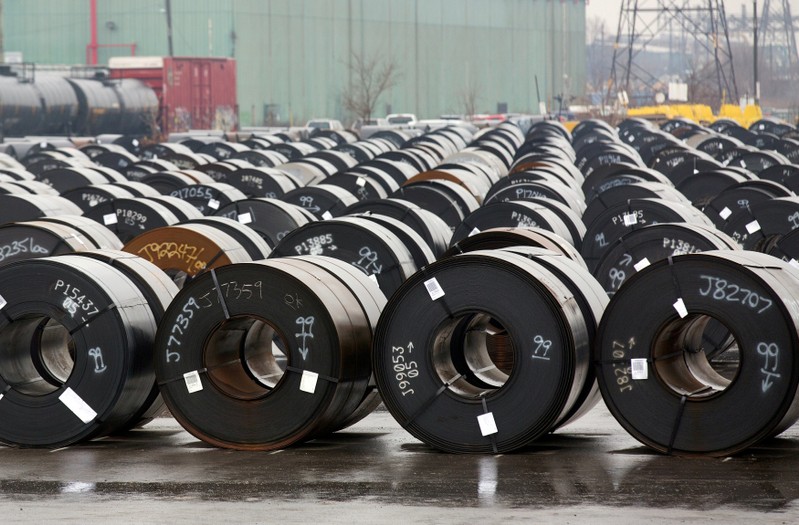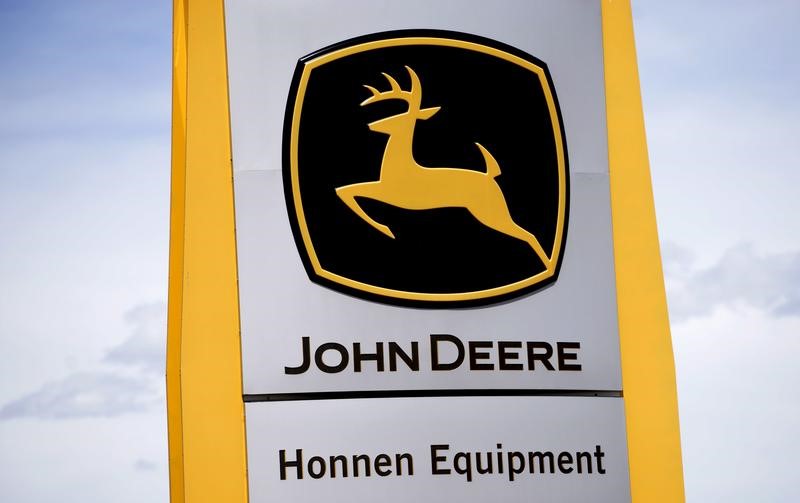
FILE PHOTO: Stored rolls of steel are seen outside the ArcelorMittal Dofasco plant, an integrated steel producer, in Hamilton, Ontario, Canada, March 7, 2018. REUTERS/Peter Power/File Photo
June 1, 2018
By Susan Heavey and Leigh Thomas
WASHINGTON/WHISTLER, British Columbia (Reuters) – U.S. President Donald Trump told Canada and the European Union on Friday to do more to bring down their trade surpluses, a day after hitting them and Mexico with import tariffs on steel and aluminum.
Trump castigated Canada, a top U.S. trade partner and ally, in a tweet on Friday morning, saying it had treated U.S. farmers “very poorly for a very long period of time.”
“Highly restrictive on Trade! They must open their markets and take down their trade barriers! They report a really high surplus on trade with us,” he wrote.
Trump also told French President Emmanuel Macron of the need to “rebalance trade with Europe,” the White House said.
The strong words followed swift responses to the tariffs by Canada, Mexico and the EU, which all plan to retaliate with levies on billions of dollars of U.S. goods, including orange juice, whiskey, blue jeans and Harley-Davidson motorcycles.
Harley-Davidson’s stock dropped 1.5 percent on Friday. The Dow Jones Industrial Average and S&P 500 index rebounded from losses on Thursday to trade about 1 percent higher. Among the gainers, shares of AK Steel rose 3.8 percent while U.S. Steel added 3.4 percent.
Brussels has lodged an eight-page list at the World Trade Organization of goods it would hit with retaliatory measures.
At a meeting of the Group of Seven top world economic powers in Canada, France’s Finance Minister Bruno Le Maire castigated the United States for its tariffs, saying Washington was isolated.
“Unfortunately we are going to have a G6 plus one with the United States alone against everyone and running the risk of economic destabilization,” Le Maire told reporters in Whistler, British Columbia.
Trump imposed the tariffs in March as part of an effort to protect U.S. industry and workers from what he described as unfair international competition, a key theme of his “America First” agenda.
Temporary exemptions were granted to a number of nations including Canada and Mexico as well as the EU. The United States on Thursday decided to let those exemptions lapse.
Canada and Mexico, who are in stalled talks with the United States to redraw the North American Free Trade Agreement (NAFTA), responded swiftly.
Canada, the largest supplier of steel to the United States, said it will impose tariffs covering C$16.6 billion ($12.8 billion) on U.S. imports, including whiskey, orange juice, steel, aluminum and other products.
Mexico announced what it described as “equivalent” measures on a wide range of U.S. farm and industrial products, including pork legs, apples, grapes, cheese, steel and other goods.
The EU’s planned measures hit U.S. exports running the gamut from big motorcycles like the Harleys, built on the home turf of U.S. House of Representatives Speaker Paul Ryan, to “canoes”, “manicure or pedicure preparations” and even “sinks and washbasins, of stainless steel” – the proverbial kitchen sink.
“We are determined to protect the multilateral system,” EU Trade Commissioner Cecilia Malmstrom said of the WTO challenge. “We are expecting everybody to play by the rules.
PUSHING BACK
Trump’s tariffs on Washington’s closest allies also drew condemnation at home from Republican lawmakers and the country’s main business lobbying group and sent a chill through financial markets.
The steel and aluminum tariffs were imposed on the EU, Canada and Mexico from midnight EDT.
Commerce Secretary Wilbur Ross had called for more talks, but the EU’s Malmstrom said the bloc’s position had been that it would not negotiate unless “You take this gun away from us”. That had not happened, so “now this door for the moment is closed.”
For the EU, a decision on just how far to push back will require agreement among the 28 member states that make up the world’s biggest trade bloc.
Germany, by far the biggest exporter to the United States, is keen to avoid a wider trade war, especially as the Trump administration has floated the prospect of tariffs on cars, which would potentially be devastating to German exporters.
Other EU countries such as France favor a more robust stance against what they see as American bullying.
EU members have so far given broad support to a European Commission plan to set duties on 2.8 billion euros ($3.4 billion) of U.S. exports. These could come into force from June 20, although EU officials said it might take a little longer.
While the U.S. administration’s decision to hit its European and North American allies with the metals tariffs was not aimed directly at China, it also sets the background for negotiations with Beijing, where Ross was headed for talks this weekend.
The Trump administration wants China to buy more U.S. goods to lower a trade deficit. Opponents of the tariffs on European and North American metals say the administration is hurting allies when it needs them most to put pressure on Beijing.
Malmstrom said over-production from China, not Europe, was to blame for the glut of steel that prompted the U.S. action. She also announced a case against China at the WTO over the alleged infringement of intellectual property rights, saying the action simultaneous with the case against the United States showed that the EU was being even-handed.
(Reporting by Eric Walsh, David Shepardson and David Chance in Washington, Ingrid Melander and Michel Rose in Paris, Madeline Chambers in Berlin, Philip Blenkinsop in Brussels and Allison Martell in Toronto; Writing by Peter Graff, Philip Blenkinsop and David Chance; Editing by Peter Graff and Paul Simao)

